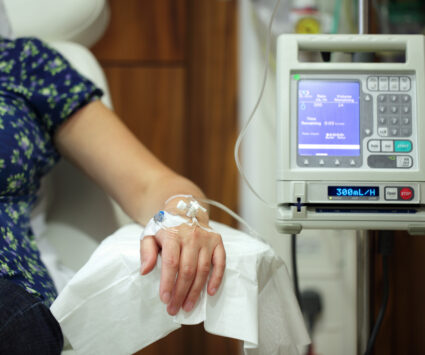If you’ve just been diagnosed with cancer, you’re probably frightened and have lots of questions. Among them is whether you need chemotherapy and at what stage of cancer is chemotherapy used. Your doctor will explain your options based on the type of cancer you have been diagnosed with.
Stages of Cancer
First, it’s crucial to know the stages of cancer and what they mean. Typically, there are four cancer stages. These stages are determined based on several components including the tumor’s location and size. These include:
- Stage 1 — The cancer is small and has not spread (metastasized).
- Stage 2 — While the cancer has grown, it has still not spread.
- Stage 3 — The tumor is larger and may have spread to the lymph nodes or other tissues.
- Stage 4 — The cancer has metastasized to other parts of the body.
The tumor’s grade plays a role in the decision about when to use chemotherapy. The grade is based on how cancer cells appear under a microscope. Low-grade cancers usually grow slowly while higher-grade cancers spread more quickly.
What Is Chemotherapy?
Chemotherapy is a term referring to drugs used to kill fast-growing cells. Chemo is most often used in cancer treatment because cancer cells grow faster than other types of cells. There are many chemotherapy drugs available. Some treat specific cancer while others are used alone or in combination to treat different types of cancer.
Chemotherapy is administered in numerous ways. This includes:
- Orally: pills or liquids that are swallowed.
- Intravenously: injected into a vein.
- Injection: from a syringe.
- Intra-arterial (IA): injected directly into an artery.
- Intraperitoneal (IP): injected into the peritoneal cavity. This area contains the intestines, liver, and stomach.
- Topically: a cream rubbed into the skin.
Chemo side effects are common, and some can be serious. However, many of these side effects are treatable. Your doctor will explain the risks to you.
At What Stage of Cancer Is Chemotherapy Used?
Chemotherapy can be used at any stage of a cancer diagnosis, depending on various factors. Chemo is used for treating cancer in all stages. While chemo is a standard treatment in later-stage cancer, chemo in earlier-stage cancer may prevent early disease from developing into a later stage.
Chemo for Early-Stage Cancer
Stages 1 and 2 are considered early-stage cancer because spreading has not occurred. While many types of early-stage cancer are treated with surgery alone or a combination of surgery and radiation, your doctor may recommend chemo if there is a risk that the cancer may spread in the future.
For example, a study published in the New England Journal of Medicine in June 2018 found that many women with the earliest stage of breast cancer probably did not need chemo post-surgery. For women diagnosed with early-stage hormone-receptor positive, HER-2 negative breast cancer that had not spread to the lymph nodes, gene expression tests can determine whether chemotherapy is beneficial based on a recurrence score.
The good news is that approximately 70% of such women will not require chemo for early-stage breast cancer. However, another 30% with high recurrence scores should consider chemotherapy. Recurrence scores range from 0 to 100. Those with a recurrence score above 25 should have chemo. Those women under 50 with a score between 16 and 25 are also chemotherapy candidates.
Chemo Before Surgery
Generally, patients undergo surgery to remove tumors before chemotherapy, but that also depends on the individual diagnosis. Chemo after surgery is referred to as adjuvant therapy.
For instance, with breast cancer, chemotherapy is often given before surgery to shrink larger tumors. This preoperative chemo is known as neoadjuvant therapy. Not only does chemotherapy before surgery increase the odds that the surgeon can remove all of the cancer, but it lowers the risk of the cancer returning. Neoadjuvant breast cancer therapy may allow a woman to retain her breast rather than undergo mastectomy.
The National Cancer Institute announced that the results of a clinical trial show that chemotherapy prior to surgery — along with the immunotherapy drug nivolumab — significantly delays the progression or return of early-stage non-small cell lung cancer. Based on the clinical trial results, the Food and Drug Administration approved the use of chemotherapy and nivolumab as a treatment combination for this type of cancer in March 2022.
Chemotherapy for Advanced Cancer
Advanced cancer may not prove curable, but it is treatable. Chemotherapy is an integral part of advanced cancer treatment because cancer types that metastasize require therapies reaching all parts of the body. Chemo can lessen pain and improve quality of life for those with late-stage cancer.
Contact Us
In 1948, Dr. Jeanne Miller, a University of California San Francisco trained pathologist, founded what has since become Yosemite Pathology and Precision Pathology. Since that time, we have been committed to providing superior and comprehensive diagnostics in anatomic pathology in the Western United States. Our dedicated pathologists offer a broad range of specialties in the field of cancer including breast, gynecologic, hematology, thyroid, urologic and other pathologies. For more information about our treatment options and services, contact us today.
Jane Meggitt’s work has appeared in dozens of publications including USA Today, Zack’s, Financial Advisor, nj.com, The Houston Chronicle and The Nest. She is a graduate of New York University.
Sources
Cleveland Clinic – Cancer: Symptoms, Stages, Types & What It Is
Mayo Clinic – Chemotherapy
Mayo Clinic – Chemotherapy for breast cancer
New England Journal of Medicine – “Adjuvant Chemotherapy Guided by a 21-Gene Expression Assay in Breast Cancer”
National Cancer Institute – Nivolumab and Chemotherapy for Early-Stage Lung Cancer

